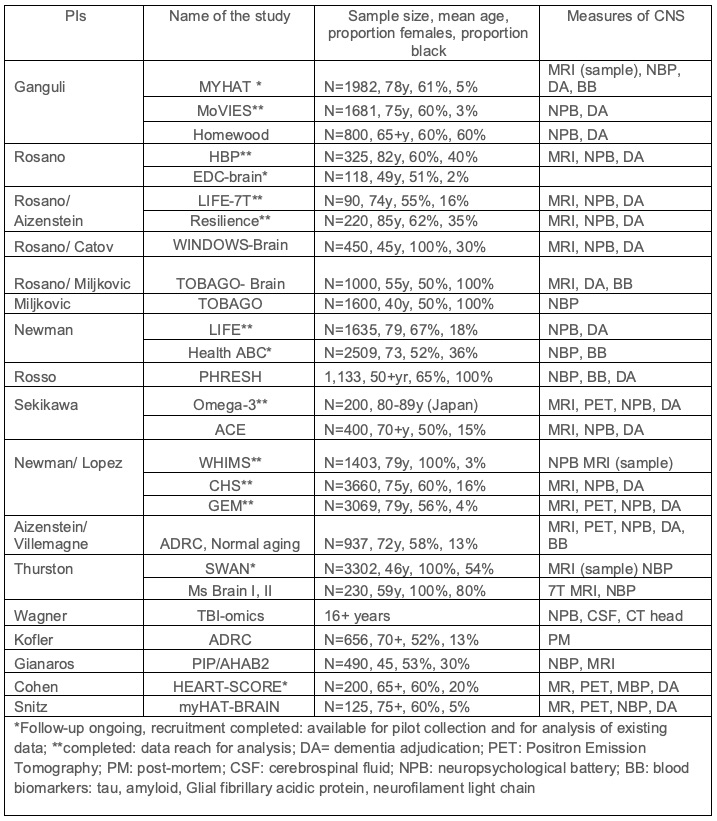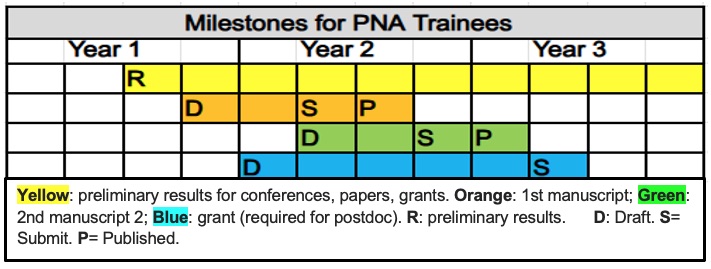eBRAIN Training
T32 Training Grant
Population Neuroscience of Aging, Alzheimer’s Disease and
Age-related Dementia (PNA)
Our Vision
To understand the causes and mechanisms of ADRD, population neuroscientists of the future must be able to link environmental exposures, lifestyles, comorbidities, and genomics with knowledge of modern technology of neurosciences and measurements of brain disease and data science.
Competencies of PNA
PNA trainees integrate key concepts in population science, neuroscience, gerontology, and data science to:
- obtain in-depth knowledge of the complex inter-relationships between the factors contributing to ADRD, and the effect of multi-morbidities accompanying aging;
- develop and apply skills in study design, data collection/ analysis and methodologies to measure CNS in vulnerable populations, including minorities and women, as early as middle-age;
- understand the demographic and health characteristics of at-risk populations vary in relation to the setting (e.g. community, specific neighborhoods, research clinic) and modify study designs accordingly;
- appreciate the changes that new technologies can bring to study designs and how to use such technological advances for novel research questions.
- upgrade data collection and study design methods in their projects, to keep up with technological advancements;
- become fluent in communicating effectively with colleagues trained according to discipline norms, while also reaching beyond traditional boundaries.
PNA Curriculum

Available Datasets

Trainee Milestones

Mentors
Expectations of mentors and co-mentors
- Time availability for regular individual meetings to establish goals, review progress and milestone accomplishments.
- Make the trainee aware of their expectations and maintain open communications with their trainee.
- Evaluate the trainee’s strengths and deficiencies and provide opportunities to build skills in needed areas.
- Provide resources to accomplish agreed upon goals: laboratory support, data for testing of novel hypotheses, generating preliminary results for grants, funds for traveling if needed, additional funds for data collections
- Provide opportunities for co-authorship of papers.
- Assist with public presentations and publishing first-authored papers.
- Provide field experience on active research studies.
- Facilitate networking locally, nationally and internationally (e.g. at conferences and remotely).
- Assist trainees with submitting pilot proposals.
- Provide guidance with the independent research project.
- Provide opportunities to do ad hoc journal reviews.
- Education & Training | CTSI University of Pittsburgh
Prior Trainees
Summary of accomplishments of PNA trainees with >1 year in training

Meet Our Students
2025-2026 PNA Epidemiology Trainees
Previous Students
Former PNA T32 Training Grant Trainees

Shruthi Venkatesh
Focus: My interested focus on developing and applying clinical informatics techniques to study neurodegenerative disease.
Primary Faculty Mentor: Dr. Xia

Kailyn Witonsky
MD/PhD Student
Focus: I am interested in working on interdisciplinary teams applying data analytics to identify and understand modifiable factors in healthy aging that can eventually lead to clinical interventions for vulnerable populations.
Primary Faculty Mentor: Dr. Rosano

Jermon Drake
Focus: My research aims to elucidate why certain racial/ethnic groups and those with lower levels of socioeconomic status are a greater risk of experiencing accelerated neurocognitive decline, and how modifiable lifestyle factors, especially physical activity, may reduce risk for Alzheimer’s disease.
Primary Faculty Mentor: Dr. Gianaros

Rebecca Ehrenkranz
Scientific Program Manager at the NIA’s Office of Clinical Research
Focus: exploring energy in aging populations across the following domains: cognition, mood, physical function, and physical activity. I have a bachelors degree from Brandeis University and an MPH from Johns Hopkins Bloomberg School of Public Health. In my spare time, I enjoy rock climbing (both indoor and outdoor).
Primary Faculty Mentor: Dr. Rosano

Mary Gantz-Marker
Post-Doctoral Trainee
Focus: Neurodegenerative diseases, particularly Chronic Traumatic Encephalopathy and Alzheimer’s Disease
Primary Faculty Mentor: Dr. Rosano

Sara Godina
PhD Student, PI of R36 grant – The impact of the neighborhood environment on cognitively healthy life years and structural markers of brain health
Topic: identifying environmental risk factors for brain aging. I am particularly interested in reduction of health disparities in dementia, among Black and Hispanic older adults. My current projects involve examining the neural correlates underlying racial differences in cognitive impairment to clarify mechanisms.
Primary Faculty Mentor: Dr. Rosso

Thomas Kraynak
Postdoctoral Fellow, Epidemiology
Focus: My research focuses on brain-body pathways that link psychological stress and stress-related peripheral physiology with physical health and brain health. In addition, I am interested in leveraging machine learning approaches to reliably identify predictors of brain health throughout the life course. Finally, I am interested in applying noninvasive neuromodulation techniques to target and potentially modify brain circuits that may link stress to dementia risk.
Primary Faculty Mentor: Dr. Andreescu

Alina Lesnovskaya
Graduate student in the Clinical and Biological Health Psychology Program, School of Arts and Sciences, University of Pittsburgh
Focus: promoting healthy brain aging through accessible non-pharmacological interventions, such as exercise training. I am also interested in utilizing functional and structural neuroimaging to study individual differences in healthy and pathological aging.
Primary Faculty Mentor: Dr. Erickson

Maria Ly, MD, PhD
Post-doctoral Associate at the Mallinckrodt Institute of Radiology, University of Michigan
Topic: Utilization of multimodal imaging and machine learning models to; 1: identify early biomarkers or predictors of outcome in aging and Alzheimer’s disease and, 2: identify risk factors and resilience factors in aging and Alzheimer’s disease.
My thesis work is based on a machine-learning algorithm that predicts brain age, which may be a proxy for brain reserve.
Primary Faculty Mentor: Dr. Aizenstein

Beth Shabaan, PhD, MPH
Assistant Professor of Epidemiology, in the School of Public Health, University of Pittsburgh
Focus: vascular contributions to cognitive impairment and dementia (VCID). I am particularly interested in the interplay of cerebrovascular integrity and Alzheimer’s disease pathology in the development of clinically overt cognitive impairment and whether promotion of cerebral small vessel integrity can prevent cognitive impairment. A new line of my work involves sex and gender differences and sex and gender-specific risk in VCID / Alzheimer’s disease and related dementias (ADRD).
Primary Faculty Mentor: Dr. Klunk

Briana Sprague, PhD
Assistant Professor at University of Indiana
Topic: My research topic involves the relationship between complex physical functions (e.g., walking) and cognitive function (broadly, but primarily interested in processing speed) in older adulthood. In addition, I want to develop an understanding of how neurological mechanisms (e.g., dopamine) impact this relationship. Ultimately, I am interested in how we can leverage these factors to prevent or attenuate declines in physical, cognitive, and everyday function in older adulthood.
Primary Faculty Mentor: Dr. Rosano























